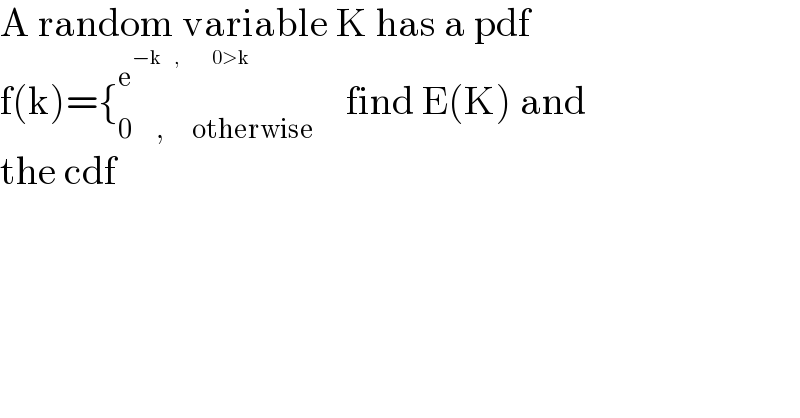
Previous in Probability and Statistics Next in Probability and Statistics
Question Number 148864 by jlewis last updated on 31/Jul/21

$$\mathrm{A}\:\mathrm{random}\:\mathrm{variable}\:\mathrm{K}\:\mathrm{has}\:\mathrm{a}\:\mathrm{pdf}\: \\ $$ $$\mathrm{f}\left(\mathrm{k}\right)=\left\{_{\mathrm{0}\:\:\:\:\:\:,\:\:\:\:\:\:\:\mathrm{otherwise}} ^{\mathrm{e}^{−\mathrm{k}\:\:\:,\:\:\:\:\:\:\:\:\mathrm{0}>\mathrm{k}} } \:\:\:\:\mathrm{find}\:\mathrm{E}\left(\mathrm{K}\right)\:\mathrm{and}\:\right. \\ $$ $$\mathrm{the}\:\mathrm{cdf} \\ $$
Answered by Olaf_Thorendsen last updated on 01/Aug/21
![I suppose f(k) = e^(−k) if k>0 otherwise f is not a pdf. ∫_(−∞) ^(+∞) f(x)dx = ∫_0 ^(+∞) e^(−x) dx = 1 E(K) = ∫_0 ^(+∞) xe^(−x) dx = [x(−e^(−x) )]_0 ^(+∞) − ∫_0 ^(+∞) (−e^(−x) )dx = 1 E(K) =1 F(k) = ∫_0 ^k e^(−x) dx = 1−e^(−k) F(k) = { ((0 if k < 0)),((1−e^(−k) if k ≥ 0)) :}](Q148873.png)
$$\mathrm{I}\:\mathrm{suppose}\:{f}\left({k}\right)\:=\:{e}^{−{k}} \:\mathrm{if}\:{k}>\mathrm{0}\:\mathrm{otherwise} \\ $$ $${f}\:\mathrm{is}\:\mathrm{not}\:\mathrm{a}\:\mathrm{pdf}. \\ $$ $$\int_{−\infty} ^{+\infty} {f}\left({x}\right){dx}\:=\:\int_{\mathrm{0}} ^{+\infty} {e}^{−{x}} {dx}\:=\:\mathrm{1} \\ $$ $$\mathrm{E}\left(\mathrm{K}\right)\:=\:\int_{\mathrm{0}} ^{+\infty} {xe}^{−{x}} {dx}\:=\:\left[{x}\left(−{e}^{−{x}} \right)\right]_{\mathrm{0}} ^{+\infty} \\ $$ $$−\:\int_{\mathrm{0}} ^{+\infty} \left(−{e}^{−{x}} \right){dx}\:=\:\mathrm{1} \\ $$ $$\mathrm{E}\left(\mathrm{K}\right)\:=\mathrm{1} \\ $$ $$\mathrm{F}\left({k}\right)\:=\:\int_{\mathrm{0}} ^{{k}} {e}^{−{x}} {dx}\:=\:\mathrm{1}−{e}^{−{k}} \\ $$ $$\mathrm{F}\left({k}\right)\:=\:\begin{cases}{\mathrm{0}\:\mathrm{if}\:{k}\:<\:\mathrm{0}}\\{\mathrm{1}−{e}^{−{k}} \:\mathrm{if}\:{k}\:\geqslant\:\mathrm{0}}\end{cases} \\ $$
Commented byjlewis last updated on 01/Aug/21
![hello sir,from [x(−e^(−x) )]_0 ^(+∞) I dont get where x has gone, and is x a variable?](Q148888.png)
$$\mathrm{hello}\:\mathrm{sir},\mathrm{from}\:\left[\mathrm{x}\left(−\mathrm{e}^{−\mathrm{x}} \right)\right]_{\mathrm{0}} ^{+\infty} \:\:\:\mathrm{I}\:\mathrm{dont}\:\mathrm{get} \\ $$ $$\mathrm{where}\:\mathrm{x}\:\mathrm{has}\:\mathrm{gone},\:\mathrm{and}\:\mathrm{is}\:\mathrm{x}\:\mathrm{a}\:\mathrm{variable}? \\ $$
Commented byOlaf_Thorendsen last updated on 01/Aug/21

$$\mathrm{I}\:\mathrm{noted}\:\mathrm{the}\:\mathrm{variable}\:{x},\:\mathrm{but}\:\mathrm{you}\:\mathrm{can} \\ $$ $$\mathrm{write}\:\mathrm{instead}\:\mathrm{of}\:{x}\::\:\mathrm{z},\:\mathrm{flower},\:\mathrm{Mickey}\:\mathrm{or} \\ $$ $$\mathrm{Donald}\:\mathrm{Trump}\:\mathrm{sir},\:\mathrm{if}\:\mathrm{you}\:\mathrm{prefer}. \\ $$
